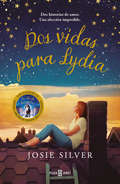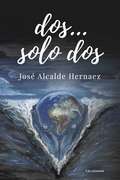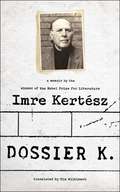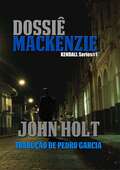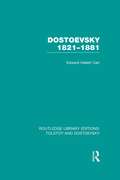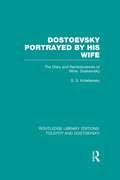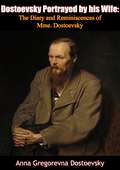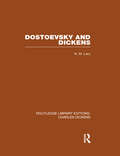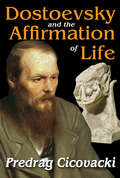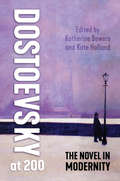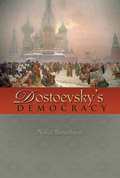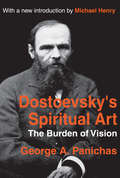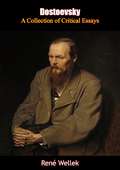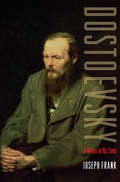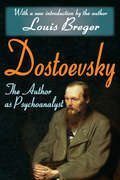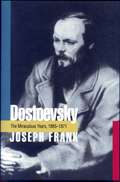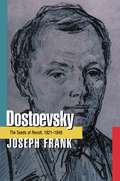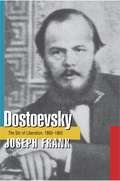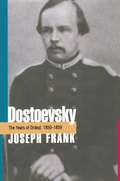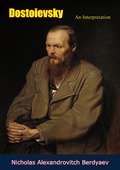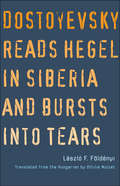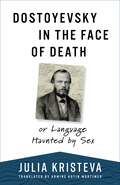- Table View
- List View
Dos vidas para Lydia
by Josie SilverLa irresistible nueva novela de la autora del fenómeno internacional Un día de diciembre volverá a robarte el corazón. La vida de Lydia da un vuelco cuando Freddie, su alma gemela y su pareja desde hace más de diez años, muere. Lydia sabe que Freddie habría querido que siguiera adelante y viviera al máximo, así que, con la ayuda de su mejor amigo, Jonah, y su hermana, Elle, decide abrirse de nuevo al mundo (y tal vez, al amor). Pero entonces sucede algo increíble: Lydia tiene la oportunidad de volver atrás y seguir viviendo junto a Freddie. La elección parece sencilla, pero ¿qué pasa si en su nueva vida hay alguien que también la quiere a su lado? Lydia deberá elegir entre dos vidas, entre dos amores; entre evadirse del dolor de la pérdida o acoger las nuevas oportunidades que le brinda el destino para volver a ser feliz. «Encantadora.»MARIAN KEYES «A los fans de Postdata: Te quiero les fascinará lo nuevo de Josie Silver.»Cosmopolitan Reseñas:«Esta lectura se quedará con los lectores mucho tiempo después de que pasen la última página.»Publishers Weekly «Fresca y conmovedora. La nueva novela de Josie Silver es una historia de amor y esperanza.»Insider «Esta reconfortante novela es la vía de escape perfecta del escalofriante mundo en el que vivimos. Te llegará al corazón.»Shemazing «Una nueva historia de amor irresistible.»The Skimm «Josie Silver lo ha vuelto a conseguir... y nos da un final que es tan gratificante como revelador.»Electric Literature «Una historia que conduce a los lectores hacia el final de película que esperan.»Kirkus Reviews «La nueva novela de Josie Silver después de Un día de diciembre gustará a sus fans consagrados y atraerá a nuevos con su humor, su corazón y su excelente prosa.»Booklist «Qué fantástico y emotivo regalo nos ha hecho Josie Silver.»JODI PICOULT Sobre Un día de diciembre:«Prepárate a dejarte arrastrar por un torbellino de emociones. Me encantó.»Reese Witherspoon «El equivalente literario a Love Actually.»The Bookseller «El ritmo es perfecto, el tono es cálido y los personajes son entrañables... Cualquiera que crea en el amor verdadero o que simplemente esté dispuesto a aceptarlo como la premisa de un fascinante cuento, quedará encantado con este debut conmovedor.»Kirkus
Dos... Solo dos
by José Alcalde HernáezPoemas y quizás más de dos razones para ser feliz. Dos... Solo dos, es un poemario escrito en lenguaje sencillo. <P><P>Combina relatos y poemas, requiere de una lectura pausada y sosegada para apreciar mejor y así situar al autor. Esta obra está cargada de sentimientos muy sensibles, razona otros tantos, relata momentos de una vida y va siempre de la mano de la imaginación, mezclando fantasía y realidad. <P><P> Además, refleja al ser humano que, con valentía, reconoce sus errores y tiene la humildad para pedir perdón. Como refleja su portada, este poemario aboga por un mundo nuevo, un mundo mejor.
Dossier K: A Memoir
by Tim Wilkinson Imre KerteszThe first and only memoir from the Nobel Prize-winning author, in the form of an illuminating, often funny, and often combative interview--conducted by the author of himself. Dossier K is Imre Kertész's response to the hasty biographies and profiles that followed his 2002 Nobel Prize, an attempt to set the record straight. But, as befits Kertész, it's a beautifully roundabout way of going straight: Kertész faces and interrogates himself about the issues and events that have long preoccupied him, while also dealing with the questions that really annoy him (such as, "Is your work autobiographical?"). The result is an extraordinary self-portrait, in which Kertész recounts memories of his childhood in Budapest; the years that lead up to the Second World War and his first encounters with anti-Semitism; the incredible forged record of his death in Buchenwald that may in fact have saved his life; his release from the camps and his return to his family; Hungary's Rákosi and Kádár regimes and the terror, hypocrisy, and absurdity they entailed; his thoughts about what other writers have written about the Holocaust; his two marriages; and his long development as a writer. This is a surprising and provocative autobiography that delves into questions about the legacy of the Holocaust, fiction and reality, and what Kertész calls "the wonderful burden of being responsible for yourself.
Dossiê Mackenzie
by John HoltKendall pode simplesmente ver na televisão. Lá estava a fotografia do governador Frank Reynolds. Na parte inferior da tela havia uma grossa faixa dizendo: governador Frank Reynolds encontrado morto. A voz no noticiário estava dando todos os detalhes disponíveis. Ao que parece seu corpo foi encontrado mais cedo naquela mesma manhã. Ele foi encontrado caído na garagem. Havia levado dois tiros. Um tiro em cima do peito, o outro no ombro. A polícia acredita que a arma usada foi uma 9mm, a voz no noticiário anunciou. Kendall levou um susto. Anthony Shaw também havia sido morto por uma 9mm. Kendall não tinha muita certeza do que tudo isso significava. Que conexão havia entre Anthony Shaw e o governador do estado e o poderoso empresário Ian Duncan. E quanto ao senador Mackenzie? Onde ele se encaixava? E quem ou o que era Latimer? A bem pouco tempo atrás Kendall era um detetive particular, um Olho Discreto, investigando um insignificante e pequeno assassinato sem pistas, sem testemunhas e sem motivos. Realmente sem nada. Agora ele tinha tantas peças que ele não sabia como encaixá-las. Ele sequer sabia se elas vinham do mesmo quebra-cabeça.
Dost Banaye Naye Naye
by Alka ShankerDost Banaye Naye Naye is two story book is written by Alka Shankar tells us the story of two girls who take care of kittens in her home इस पुस्तक में दो कहानियाँ है जिसमें दो बहने बिल्ली के बच्चों को अपने घर में पालती है तथा दूसरी कहानी में लीला की नानी लीला को एक पौधा उपहार में देती है और लीला उसकी देखभाल करती है। दोनों कहानियाँ हमें दूसरों की मदद करना सिखाती है।
Dost Tujhe Salam: दोस्त तुझे सलाम
by Dr Sushma Deshmukhइस पुस्तक में लिखी कथायें चिकित्सकों के अनुभवों के अथाह सागर से मंथन करके निकले हुए अनमोल माणिक, हीरे, मोती और हमारी रोज़मर्रा की भागदौड़ भरी ज़िन्दगी में मिलने वाले संस्कारों का पाठ हैं। उम्र, शिक्षा तथा अनुभवों का यहाँ प्रश्न ही नहीं उठता। ये कथाएँ करुणा, ममता, हिम्मत, सेवा, सामाजिक कर्त्तव्य जैसे अलग-अलग गुणों का अद्भुत संगम हैं। इन कथाओं में हर बात निराली हैं। ज़िन्दगी में आने वाले तूफ़ान (बीमारी) को हिम्मत से मात देने वाली प्रेरणादायक बातें विलक्षण ही होती हैं। अपने कुटुंब, मित्र, समाज तथा दुनिया के कल्याण के लिए प्राण न्योछावर करने वाले व्यक्ति ही सच्चे आदर्श (हीरो, हीरोइन) हैं।
Dostoevsky 1821-1881: A New Biography (Routledge Library Editions: Tolstoy and Dostoevsky)
by E.H. CarrThe bare events of Dostoevsky’s life – his father murdered by peasants, his own ordeal before a firing squad, then exile in Siberia, his epilepsy, gambling, poverty and debts – go far to account for his strange intensity of vision. This biography, first published in 1931, traces his wayward development, from his strict and secluded childhood to his debut as ‘literary pimple’, through his years of anguish, to his maturity as artist and final apotheosis as Russian patriot. Written some fifty years after Dostoevsky’s death, when the material necessary for a full study first became available, Carr’s classic study reflects an approach to the life and genius of Dostoevsky dominated by the concerns of the mid-twentieth century. With its illuminating chapters on each of the great novels and its stylistic precision, this treatment of Dostoevsky remains a perfect introduction to the man, both as a novelist and as a human being.
Dostoevsky Portrayed by His Wife: The Diary and Reminiscences of Mme. Dostoevsky (Routledge Library Editions: Tolstoy and Dostoevsky)
by S. S. KotelianskyThe two note-books of the diary of Mme. Dostoevsky, the rough notes of her lengthy Reminiscences, unfinished at the time of her death, all in her own hand-writing, and copies of her husband’s letters to her from 1866 to 1881, were found in August 1922. The Diary is a large volume of about 400 pages, published in the original Russian by the Central Archives in 1923. Both note-books relate to the time when the Dostoevskys were living abroad – in Berlin, Dresden and Baden – whilst the Reminiscences was intended as a complete character portrait. This volume, first published in 1923, presents such selections from the entries in the diary, the Reminiscences, and correspondence as is valuable for the better understanding of Dostoevsky. It offers remarkable insights into his often opaque personality, particularly in relation to his personal habits, his manner and character, and his relationship with his devoted wife, Anna Gregorevna.
Dostoevsky Portrayed by his Wife: The Diary and Reminiscences of Mme. Dostoevsky
by Anna Gregorevna Dostoevsky S. S. KotelianskyFyodor Mikhailovich Dostoevsky (11 November 1821 - 9 February 1881) was a Russian novelist, short story writer, essayist, journalist and philosopher. Dostoevsky’s literary works explored human psychology in the troubled political, social, and spiritual atmosphere of 19th-century Russia, and engaged with a variety of philosophical and religious themes. He became one of the most widely read and highly regarded Russian writers. His writings were widely read both within and beyond his native Russia and influenced an equally great number of later writers, including Russians like Aleksandr Solzhenitsyn and Anton Chekhov, as well as philosophers such as Friedrich Nietzsche and Jean-Paul Sartre.This book, first published in its present form in 1926, contains portions of the Diary of Dostoevsky’s second wife, Anna Dostoevsky, the rough notes of her Reminiscences, and copies of Fyodor Dostoevsky’s letters to her from 1866 to 1881. All of these, in her own handwriting, were found in August 1922 and delivered by the representative of the Commissar of Education in Georgia (in the Caucasus) to the directors of the Moscow Archives, and serve to provide a clear portrait of Dostoevsky’s wife during the last fourteen years of his life.“Mme. Dostoevsky, with her practical mind, abounding energy, indomitable will and capacity for seeing things through when once a decision was made, is here revealed as the true complement of Dostoevsky, who was rather incompetent in practical affairs.”—Prefatory NoteThe book is also beautifully illustrated with 4 full-page plates.
Dostoevsky and Dickens: Routledge Library Editions: Charles Dickens Volume 9 (Routledge Library Editions: Charles Dickens)
by N M LaryWhat did Dickens mean to Dostoevsky, and what did the Russian writer owe to England’s greatest entertainer? Many of Dickens’ readers, including George Gissing and Edmund Wilson, have recognized that his achievement needs to be compared with Dostoevsky’s, and they have suspected, or assumed an influence. N M Lary’s book shows what the literary influence really or probably was.
Dostoevsky and the Affirmation of Life
by Predrag CicovackiDostoevsky's philosophy of life is unfolded in this searching analysis of his five greatest works: Notes from the Underground, Crime and Punishment, The Idiot, The Possessed, and The Brothers Karamazov. Predrag Cicovacki deals with a fundamental issue in Dostoevsky's opus neglected by all of his commentators: How can we affirm life and preserve a healthy optimism in the face of an increasingly troublesome reality? This work displays the vital significance of Dostoevsky's philosophy for understanding the human condition in the twenty-first century.The main task of this insightful effort is to reconstruct and examine Dostoevsky's "aesthetically" motivated affirmation of life, based on cycles of transgression and restoration. If life has no meaning, as his central figures claim, it is absurd to affirm life and pointless to live. Since Dostoevsky's doubts concerning the meaning of life resonate so deeply in our own age of pessimism and relativism, the central question of this book, whether Dostoevsky can overcome the skepticism of his most brilliant creation, is innately relevant.This volume includes a thorough literary analysis of Dostoevsky's texts, yet even those who have not read all of these novels will find Cicovacki's analysis interesting and enthralling. The reader will easily extrapolate Cicovacki's own philosophical interpretation of Dostoevsky's literary heritage.
Dostoevsky at 200: The Novel in Modernity
by Katherine Bowers and Kate HollandMarking the bicentenary of Dostoevsky’s birth, Dostoevsky at 200: The Novel in Modernity takes the writer’s art – specifically the tension between experience and formal representation – as its central theme. While many critical approaches to Dostoevsky’s works are concerned with spiritual and philosophical dilemmas, this volume focuses instead on questions of design and narrative to explore Dostoevsky and the novel from a multitude of perspectives. Contributors situate Dostoevsky’s formal choices of narrative, plot, genre, characterization, and the novel itself within modernity and consider how the experience of modernity led to Dostoevsky’s particular engagement with form. Conceived as a forum for younger scholars working in new directions in Dostoevsky scholarship, this volume asks how narrative and genre shape Dostoevsky’s works, as well as how they influence the way modernity is represented. Of interest not only to readers and scholars of Russian literature but also to those curious about the genre of the novel more broadly, Dostoevsky at 200 is pathbreaking in its approach to the question of Dostoevsky’s contribution to the novel as a form.
Dostoevsky in Context
by Martinsen, Deborah A. and Maiorova, Olga Deborah A. Martinsen Olga MaiorovaThis volume explores the Russia where the great writer, Fyodor Dostoevsky (1821–1881), was born and lived. It focuses not only on the Russia depicted in Dostoevsky's works, but also on the Russian life that he and his contemporaries experienced: on social practices and historical developments, political and cultural institutions, religious beliefs, ideological trends, artistic conventions and literary genres. Chapters by leading scholars illuminate this broad context, offer insights into Dostoevsky's reflections on his age, and examine the expression of those reflections in his writing. Each chapter investigates a specific context and suggests how we might understand Dostoevsky in relation to it. Since Russia took so much from Western Europe throughout the imperial period, the volume also locates the Russian experience within the context of Western thought and practices, thereby offering a multidimensional view of the unfolding drama of Russia versus the West in the nineteenth century.
Dostoevsky's Democracy
by Nancy RuttenburgDostoevsky's Democracy offers a major reinterpretation of the life and work of the great Russian writer by closely reexamining the crucial transitional period between the early works of the 1840s and the important novels of the 1860s. Sentenced to death in 1849 for utopian socialist political activity, the 28-year-old Dostoevsky was subjected to a mock execution and then exiled to Siberia for a decade, including four years in a forced labor camp, where he experienced a crisis of belief. It has been influentially argued that the result of this crisis was a conversion to Russian Orthodoxy and reactionary politics. But Dostoevsky's Democracy challenges this view through a close investigation of Dostoevsky's Siberian decade and its most important work, the autobiographical novel Notes from the House of the Dead (1861). Nancy Ruttenburg argues that Dostoevsky's crisis was set off by his encounter with common Russians in the labor camp, an experience that led to an intense artistic meditation on what he would call Russian "democratism." By tracing the effects of this crisis, Dostoevsky's Democracy presents a new understanding of Dostoevsky's aesthetic and political development and his role in shaping Russian modernity itself, especially in relation to the preeminent political event of his time, peasant emancipation.
Dostoevsky's Spiritual Art: The Burden of Vision
by George PanichasFyodor Dostoevsky's highest and most permanent achievement as a novelist lies in his exploration of man's religious complex, his world and his fate. His primary vision is to be found in his last five novels: Crime and Punishment, The Idiot, The Devils, A Raw Youth, and The Brothers Karamazov. This volume culminates twenty years of studying, teaching, and writing on Dostoevsky. Here George A. Panichas critically analyzes the religious themes and meanings of the author's major works. Focusing on the pervasive spiritual consciousness at play, Panichas views Dostoevsky not as a religious doctrinaire, but as a visionary whose five great novels constitute a sequential meditation on man's human and superhuman destiny.
Dostoevsky: A Collection of Critical Essays
by René WellekFirst published in 1962, the present volume is a collection of critical essays on selected works by Fyodor Dostoevsky (1821-1881), the famous 19th century Russian novelist, short story writer, essayist, journalist and philosopher.Critical evaluation of Fyodor Dostoevsky has been marked by sharp and violently bitter extremes. René Wellek has assembled a wide spectrum of these varied critical attitudes toward the works of the great Russian “tragedian of ideas.” Dostoevsky’s work is seen from psychoanalytical, existential, theological, and Marxist points of view. Professor Wellek’s introduction sketches the history of Dostoevsky criticism and influence in all main countries—a task never before attempted.The essays in this collection are:PHILIP RAHV—Dostoevsky in Crime and PunishmentMURRAY KRIEGER—Dostoevsky’s “Idiot”: The Curse of SaintlinessIRVING HOWE—Dostoevsky: The Politics of SalvationELISEO VIVAS—The Two Dimensions of Reality in The Brothers KaramazovD. H. LAWRENCE—Preface to Dostoevsky’s “The Grand Inquisitor”SIGMUND FREUD—Dostoevsky and ParricideGEORG LUKÁCS—DostoevskyDMITRI CHIZHEVSKY—The Theme of the Double in DostoevskyV. V. ZENKOVSKY—Dostoevsky’s Religious and Philosophical ViewsDEREK TRAVERSI—Dostoevsky
Dostoevsky: A Writer in His Time
by Joseph FrankA magnificent one-volume abridgement of one of the greatest literary biographies of our timeJoseph Frank's award-winning, five-volume Dostoevsky is widely recognized as the best biography of the writer in any language—and one of the greatest literary biographies of the past half-century. Now Frank's monumental, 2,500-page work has been skillfully abridged and condensed in this single, highly readable volume with a new preface by the author. Carefully preserving the original work's acclaimed narrative style and combination of biography, intellectual history, and literary criticism, Dostoevsky: A Writer in His Time illuminates the writer's works—from his first novel Poor Folk to Crime and Punishment and The Brothers Karamazov—by setting them in their personal, historical, and above all ideological context. More than a biography in the usual sense, this is a cultural history of nineteenth-century Russia, providing both a rich picture of the world in which Dostoevsky lived and a major reinterpretation of his life and work.
Dostoevsky: The Author as Psychoanalyst
by George SantayanaAndre Gide once said that Feodor Dostoevsky "lost himself in the characters of his books, and, for this reason, it is in them that he can be found again." In "Dostoevsky: The Author as Psychoanalyst", Louis Breger approaches Dostoevsky psychoanalytically, not as a "patient" to be analyzed, but as a fellow psychoanalyst, someone whose life and fiction are intertwined in the process of literary self-exploration.Raskolnikov's dream of the suffering horse in "Crime and Punishment" has become one of the best known in all literature, its rich imagery expressing meaning on many levels. Using this as a starting point, Breger goes on to offer a detailed analysis of the novel, situating it at the pivotal point in Dostoevsky's life between the death of his first wife and his second marriage. Using insights from his psychological training, Breger also explores other works by Dostoevsky, among them his early novel, "The Double", which Breger relates to the nervous breakdown that Dostoevsky suffered in his twenties, as well as "Notes from Underground", "The Possessed", "The Idiot", "The Brothers Karamazov", and so forth. Additionally, details from Dostoevsky's own life - his compulsive gambling, his epilepsy, his philosophical, political, religious, and mystical beliefs, and the interpretations of them found in existing biographies - are analyzed in detail.
Dostoevsky: The Miraculous Years, 1865-1871
by Joseph FrankThis volume, the fourth of five planned in Joseph Frank's widely acclaimed biography of Dostoevsky, covers the six most remarkably productive years in the novelist's entire career. It was in this short span of time that Dostoevsky produced three of his greatest novels--Crime and Punishment, The Idiot, and The Devils--and two of his best novellas, The Gambler and The Eternal Husband. All these masterpieces were written in the midst of harrowing practical and economic circumstances, as Dostoevsky moved from place to place, frequently giving way to his passion for roulette. Having remarried and fled from Russia to escape importuning creditors and grasping dependents, he could not return for fear of being thrown into debtor's prison. He and his young bride, who twice made him a father, lived obscurely and penuriously in Switzerland, Germany, and Italy, as he toiled away at his writing, their only source of income. All the while, he worried that his recurrent epileptic attacks were impairing his literary capacities. His enforced exile intensified not only his love for his native land but also his abhorrence of the doctrines of Russian Nihilism--which he saw as an alien European importation infecting the Russian psyche. Two novels of this period were thus an attempt to conjure this looming spectre of moral-social disintegration, while The Idiot offered an image of Dostoevsky's conception of the Russian Christian ideal that he hoped would take its place.
Dostoevsky: The Seeds of Revolt, 1821-1849
by Joseph FrankThe term "biography" seems insufficiently capacious to describe the singular achievement of Joseph Frank's five-volume study of the life of the great Russian novelist Fyodor Dostoevsky. One critic, writing upon the publication of the final volume, casually tagged the series as the ultimate work on Dostoevsky "in any language, and quite possibly forever." Frank himself had not originally intended to undertake such a massive work. The endeavor began in the early 1960s as an exploration of Dostoevsky's fiction, but it later became apparent to Frank that a deeper appreciation of the fiction would require a more ambitious engagement with the writer's life, directly caught up as Dostoevsky was with the cultural and political movements of mid- and late-nineteenth-century Russia. Already in his forties, Frank undertook to learn Russian and embarked on what would become a five-volume work comprising more than 2,500 pages. The result is an intellectual history of nineteenth-century Russia, with Dostoevsky's mind as a refracting prism.The volumes have won numerous prizes, among them the National Book Critics Circle Award for Biography, the Christian Gauss Award of Phi Beta Kappa, the Los Angeles Times Book Prize, and the James Russell Lowell Prize of the Modern Language Association.
Dostoevsky: The Stir of Liberation, 1860-1865
by Joseph FrankThe book description for the previously published "Dostoevsky: The Stir of Liberation, 1860-1865" is not yet available.
Dostoevsky: The Years of Ordeal, 1850-1859
by Joseph FrankThe description for this book, Dostoevsky: The Years of Ordeal, 1850-1859, will be forthcoming.
Dostoievsky: An Interpretation
by Nicholas Alexandrovitch BerdyaevDOSTOIEVSKY has played a decisive part in my spiritual life. While I was still a youth a slip from him, so to say, was grafted upon me. He stirred and lifted up my soul more than any other writer or philosopher has done, and for me people are always divided into “dostoievskyites” and those to whom his spirit is foreign. It is undoubtedly due to his “cursed questioning” that philosophical problems were present to my consciousness at so early an age, and some new aspect of him is revealed to me every time I read him. The Legend of the Grand Inquisitor, in particular, made such an impression on my young mind that when I turned to Jesus Christ for the first time I saw him under the appearance that he bears in the Legend.At the base of my notion of the world as I see it there has always lain the idea of liberty, and in this fundamental intuition of liberty I found Dostoievsky as it were on his own special ground. Accordingly, I long wanted to devote a book to him but was able to realize my wish only to the extent of a few articles. Finally, the lectures which I delivered on him at the seminar I directed during the winter of 1920-21 determined me to bring together my thoughts on the subject, and so this book came to be written. In it I have not only tried to display Dostoievsky’s own conception of the world, but also to set down a considerable part of what constitutes my own.—Nicholas Alexandrovitch Berdyaev
Dostoyevsky Reads Hegel in Siberia and Bursts into Tears (The Margellos World Republic of Letters)
by Laszlo FoldenyiAn exemplary collection of work from one of the world&’s leading scholars of intellectual history László F. Földényi is a writer who is learned in reference, taste, and judgment, and entertaining in style. Taking a place in the long tradition of public intellectual and cultural criticism, his work resonates with that of Montaigne, Rilke, and Mann in its deep insight into aspects of culture that have been suppressed, yet still remain in the depth of our conscious. In this new collection of essays, Földényi considers the fallout from the end of religion and how the traditions of the Enlightenment have replaced neither the metaphysical completeness nor the comforting purpose of the previously held mythologies. Combining beautiful writing with empathy, imagination, fascination, and a fierce sense of justice, Földényi covers a wide range of topics that include a meditation on the metaphysical unity of a sculpture group and an analysis of fear as a window into our relationship with time.
Dostoyevsky in the Face of Death: or Language Haunted by Sex (European Perspectives: A Series in Social Thought and Cultural Criticism)
by Julia KristevaJulia Kristeva has been both attracted and repelled by Dostoyevsky since her youth. In this extraordinary book, by turns poetic and intensely personal, she brings her unique critical sensibility to bear on the tormented and visionary Russian author.Kristeva ranges widely across Dostoyevsky’s novels and his journalism, plunging deep into the great works—and many of the smaller ones—to investigate her fascination with the Russian author. What emerges is a luminous vision of the writer’s achievements, seen in a wholly new way through Kristeva’s distinctive perspective on language. With her keen psychoanalytical eye, she offers brilliant insights into the passionate heroines of the great novels. Focusing on Dostoyevsky’s polyphonic writing, Kristeva also demonstrates the importance of Orthodox Christianity throughout his body of work, analyzing the complex ways his carnivalesque theology informs his fiction and commentary.An original and profound interpretation of one of the nineteenth century’s greatest writers, this book’s insights are also relevant to the twentieth and twenty-first centuries—up to our unsettled present, to which Kristeva’s humane reading of the suffering Russian author brings understanding and even solace.
